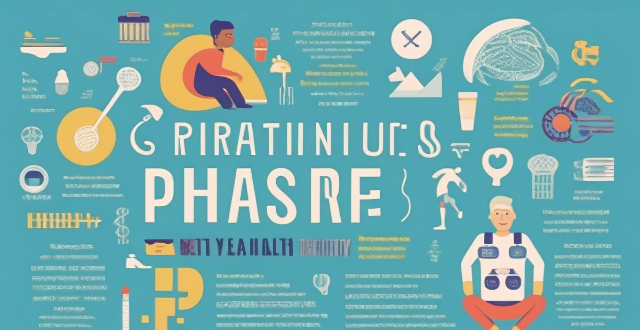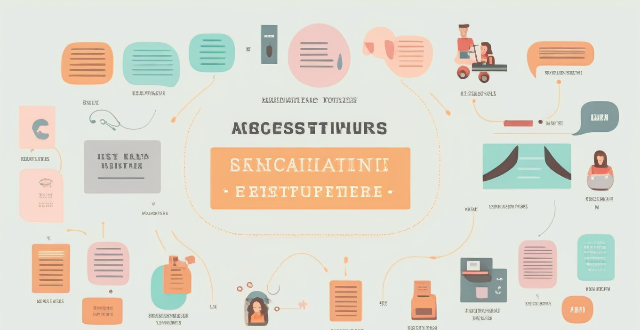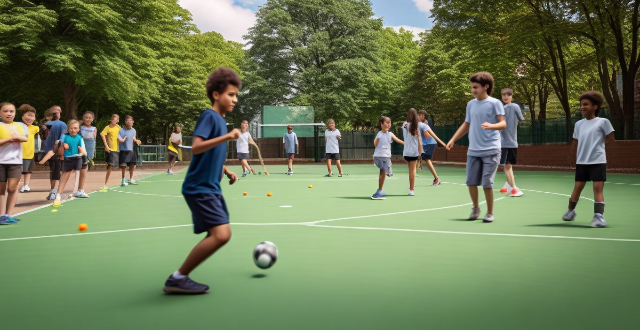Mental Education

In what ways can sports education improve mental health and well-being ?
Sports education plays a crucial role in enhancing mental health and overall well-being by offering numerous benefits that contribute to the development of a healthy mind and body. It helps reduce stress, improve self-esteem, promote better sleep, provide opportunities for social interaction, teach goal setting, time management, resilience and perseverance, and develop mindfulness and focus. By promoting physical activity, social interaction, goal setting, time management, resilience, and mindfulness, sports education can help individuals develop the skills they need to lead healthy, fulfilling lives.

How do these education policy updates align with global education standards ?
Education policy updates align with global education standards in various ways, including curriculum reform, diverse assessment methods, teacher professional development, technology integration, and prioritizing student well-being and inclusivity. These efforts aim to equip students with the necessary skills and knowledge to thrive in a globalized world.

How can we address the stigma surrounding mental health in women ?
Summary: Addressing the stigma surrounding mental health in women requires a comprehensive approach involving education, awareness, and advocacy. Public education campaigns can help demystify mental health, while school programs can teach young girls that it's okay to seek help. Corporate training and media representation can also play a role in changing public perception. Support groups, mental health advocates, government policies, and employer policies can provide support and resources for women struggling with mental health issues. By working together, we can create a society where women feel comfortable discussing their mental health and seeking help without fear of judgment or discrimination.

How can technology be used to enhance learning for students with special education needs ?
Technology can significantly enhance learning for students with special education needs by offering personalized experiences, accessibility features, collaboration tools, data-driven insights, and safety/mental health support.

How does climate change affect children's mental wellbeing ?
Climate change has a significant impact on children's mental wellbeing, leading to anxiety, fear, emotional distress, grief, and loss. However, by educating children about the issue, providing access to mental health services, and building strong communities, we can help mitigate these effects and support children's overall wellbeing.

How can schools improve student mental health ?
Improving student mental health is crucial for academic success and overall well-being. Schools can help by creating a supportive environment, implementing mental health programs, providing access to resources, promoting healthy habits, addressing bullying and harassment, offering extracurricular activities, monitoring academic pressure, and encouraging self-care. By implementing these strategies, schools can create an environment that supports the mental health of all students, allowing them to thrive both academically and personally.

What are the latest updates in education policy ?
The latest updates in education policy focus on improving the quality of education, increasing accessibility, and preparing students for future challenges. Key areas of reform include remote learning and online education, inclusive education, curriculum reform, teacher professional development, and funding and resource allocation. These changes aim to create a more effective and equitable educational system for all students.

What are the challenges faced by remote education platforms ?
The challenges faced by remote education platforms include technical issues such as slow internet connections, inadequate hardware, and software compatibility. Educational quality can be affected due to limited interaction, the need for curriculum adaptation, and difficulties in assessment. Accessibility is a concern due to the digital divide, language barriers, and disabilities. Teacher training and support may be lacking, leading to suboptimal learning experiences for students. Student motivation and mental health can also be impacted by reduced face-to-face interaction and prolonged periods of isolation. These challenges underscore the need for continuous improvement and innovation in remote education to ensure equal opportunities for all students.

What is the impact of social media on women's mental well-being ?
Social media has become an integral part of our daily lives, and it has both positive and negative impacts on women's mental well-being. In this article, we will discuss the various ways in which social media affects women's mental health. ### Negative Impacts: #### 1. **Comparison and Jealousy** One of the most significant negative impacts of social media on women's mental well-being is the constant comparison and jealousy that arises from seeing other people's highlight reels. Women often compare themselves to others on social media, leading to feelings of inadequacy and low self-esteem. This can result in anxiety, depression, and even eating disorders. #### 2. **Cyberbullying and Harassment** Social media platforms are also notorious for cyberbullying and harassment, particularly towards women. Online harassment can take many forms, including trolling, stalking, sexual harassment, and doxxing. These actions can have severe consequences on a woman's mental health, leading to trauma, anxiety, and depression. #### 3. **Addiction and Time Management** Social media addiction is another issue that affects women's mental well-being. Spending excessive time on social media can lead to procrastination, reduced productivity, and poor time management skills. This can cause stress, anxiety, and feelings of guilt, ultimately affecting a woman's overall mental health. #### 4. **Body Image Issues** Social media is flooded with images of perfect bodies and beauty standards, which can negatively impact a woman's body image. Constant exposure to these unrealistic beauty standards can lead to body dysmorphia, eating disorders, and low self-esteem. ### Positive Impacts: Despite the negative impacts, social media also has some positive effects on women's mental well-being. #### 1. **Support and Community** Social media provides a platform for women to connect with like-minded individuals and form supportive communities. These online communities can offer emotional support, advice, and encouragement, helping women cope with various issues they face in their personal and professional lives. #### 2. **Education and Awareness** Social media is an excellent source of information and education on various topics related to women's health, such as menstrual hygiene, reproductive rights, and breast cancer awareness. This increased awareness can empower women to make informed decisions about their health and well-being. #### 3. **Self-expression and Creativity** Social media platforms provide women with an opportunity to express themselves creatively through writing, photography, art, or other forms of content creation. This creative outlet can serve as a therapeutic tool for women to cope with stress, anxiety, or depression. #### 4. **Career Opportunities** Social media has opened up numerous career opportunities for women in fields such as digital marketing, content creation, and influencer marketing. These opportunities allow women to pursue their passions while maintaining flexible work schedules that accommodate their personal lives. In conclusion, social media has both positive and negative impacts on women's mental well-being. While it can lead to comparison, jealousy, cyberbullying, addiction, and body image issues, it also provides support, education, self-expression, and career opportunities. It is essential for women to be aware of these impacts and use social media mindfully to maintain their mental health and well-being.

How does climate change impact mental health ?
Climate change has a multifaceted impact on mental health, including direct effects such as trauma from extreme weather events and environmental degradation, and indirect effects like economic strain and social disruption. Mitigating this impact involves raising awareness, strengthening community resilience, investing in mental health services, advocating for policies that address both climate change and public health concerns, and encouraging sustainable practices.

How do sports psychologists assist coaches in understanding and managing their athletes' mental health ?
Sports psychologists assist coaches in managing athletes' mental health by providing education, individual assessments, mental skills training, counseling, team building activities, crisis intervention, and feedback. This support helps coaches create a supportive environment for athletes to perform at their best mentally and physically.

How does sports education contribute to physical fitness and overall health ?
This text discusses the importance of sports education in promoting physical fitness and overall health. It highlights various benefits such as improved cardiovascular health, muscular strength, weight management, mental well-being, social interaction, and injury prevention. The text emphasizes the role of sports education in fostering healthy lifestyle habits and reducing the risk of obesity-related health issues, heart diseases, and stroke. It also mentions the mental health benefits of engaging in sports activities, including reduced stress, anxiety, and depression. Finally, the text underscores the importance of sports education in developing teamwork skills, leadership qualities, and problem-solving abilities.

How do these new education policies impact students and teachers ?
The implementation of new education policies can have significant effects on both students and teachers. Potential impacts on students include changes in academic performance, mental health, and access to education. For teachers, new policies may require professional development, adjustments in teaching approaches, and increased workload and stress levels. It is crucial to consider the potential effects before implementing any changes and ensure that they align with the goals of providing high-quality education for all students.

What are the benefits of sports education for children's development ?
Sports education offers a wide range of benefits for children's development, including improved physical fitness, motor skills, cognitive abilities, stress reduction, social skills, self-esteem, emotional regulation, and resilience. These skills are essential for building strong relationships and succeeding in both personal and professional life. By encouraging children to participate in sports activities, parents and educators can help them lead healthier lives and develop life skills that will serve them well into adulthood.

How can we promote self-care and self-love for women's mental health ?
Promoting self-care and self-love for women's mental health requires a comprehensive approach that includes creating awareness, providing resources, and establishing supportive environments. This involves understanding the importance of mental health, dispelling misconceptions, normalizing conversations, providing accessible information, offering therapeutic support, building community networks, implementing workplace initiatives, advocating for policies, encouraging mindfulness and meditation, promoting healthy lifestyle habits, and fostering self-reflection and growth. By adopting these strategies, we can empower women to take charge of their mental health and lead fulfilling lives.

How do you identify a child who may have special education needs ?
Identifying a child with special education needs is crucial for providing them with the right support and interventions. Signs include delayed developmental milestones, difficulty in school, unusual behaviors or habits, and health concerns. If you suspect a child may have special education needs, consult with professionals to determine the appropriate course of action.

How important is mental health in managing a sports career ?
This article discusses the importance of mental health in managing a sports career. It explains how mental health affects an athlete's performance, recovery, team dynamics, off-field success, and personal growth. The article emphasizes that athletes with good mental health are more likely to set goals, work hard towards achieving them, and push through challenges. It also highlights the role of mental health in developing life skills that extend beyond an athlete's sports career. Overall, the article underscores the significance of prioritizing mental well-being for athletes to maximize their potential both as individuals and members of their teams.

How do remote education platforms cater to students with special needs ?
Remote education platforms offer a range of accessibility features, personalization options, and support services to cater to the needs of students with special needs. These include text-to-speech and speech-to-text features, closed captions and transcripts, alternative formats for course materials, customizable settings, flexible scheduling, adaptive learning technologies, tutoring and mentoring services, accommodations and modifications, and counseling and mental health support. By providing these resources, remote education platforms can help ensure that all students have equal opportunities to succeed in their courses.

Why is it important for schools to prioritize sports education in their curriculum ?
Sports education is crucial for a student's overall development, promoting physical fitness and life skills. It improves physical health, motor skills, mental well-being, social skills, and academic performance. By prioritizing sports education, schools can create well-rounded individuals prepared for success in all aspects of life.

What is the relationship between sports participation and improved mental health from a public policy perspective ?
The relationship between sports participation and improved mental health is complex and multifaceted, involving considerations of individual well-being, societal benefits, economic implications, and governmental responsibilities. Regular exercise through sports can lead to better physical health, which positively impacts mental health by releasing endorphins and reducing stress. Social interaction promoted by team sports and community building through sports events enhances social support networks crucial for mental health. From a societal perspective, promoting sports participation can serve as a preventive measure against mental health disorders, potentially reducing healthcare costs and improving educational outcomes. Economically, a healthier workforce and tourism opportunities from sports events can boost productivity and local economies. Governments have responsibilities in funding sports facilities, integrating sports into education, and running public awareness campaigns. Overall, fostering sports participation through supportive policies can significantly improve public mental health while offering broader societal and economic advantages.

How can educational psychology aid in addressing students' mental health issues ?
Educational psychology can aid in addressing students' mental health issues by understanding the role of emotional intelligence, promoting a positive school climate, providing early intervention and support services, encouraging self-care and resilience, and facilitating collaboration between educators and mental health professionals.

What is the importance of mental health in overall personal well-being ?
The text discusses the importance of mental health in overall personal well-being. It explains how good mental health can lead to better physical health, emotional stability, healthy social relationships, workplace productivity, and an improved quality of life. The article emphasizes the need for prioritizing mental health by seeking professional help when needed, practicing self-care, and engaging in activities that promote good mental health.

What is the best approach for training teachers in special education needs ?
This text discusses the importance of training teachers in special education needs (SEN) to ensure all students receive an appropriate education. It suggests a comprehensive approach that includes understanding the importance of SEN, foundational knowledge and skills, practical application, emotional and behavioral support, communication and partnership, and continuous professional development. The text emphasizes the need for ongoing training, reflective practice, and collaboration with professionals from related fields to provide holistic support for students with SEN.

What role do schools play in promoting child safety education ?
Schools play a crucial role in promoting child safety education. They create awareness through classroom instruction, assemblies, and workshops on topics like internet safety and emergency preparedness. Practical application is emphasized through drills, simulations, and field trips with safety guidelines. Physical safety measures include secure campuses and safe playgrounds. Emotional and mental health support is provided through counseling services and peer support programs. Family involvement is encouraged through parent-teacher conferences and information sharing. Community partnerships with local law enforcement and emergency service workshops enhance safety education. Safety topics are integrated into the curriculum through cross-curricular teaching and service learning projects. Clear policies and consistent procedures ensure everyone knows how to respond in emergencies. Resource allocation prioritizes safety equipment, training, and updating facilities. Overall, schools collaborate with families and community partners to effectively prepare children for potential risks and protect themselves in various situations.

Are there specific exercises that help improve mental health ?
Exercises like yoga, meditation, aerobic exercise, resistance training, MBSR, and Tai Chi can help improve mental health by reducing stress, anxiety, and depression symptoms while promoting relaxation, self-awareness, and social interaction.

How will these education policy updates impact the future of education in our society ?
Education policy updates may increase access to education, emphasize STEM education, and improve student outcomes.

In what ways does poor personal hygiene impact mental health ?
Poor personal hygiene can negatively affect mental health by causing decreased self-esteem, social isolation, and exacerbating symptoms of mental health disorders. It is important to maintain good hygiene habits for overall well-being.

What impact has the pandemic had on mental health and well-being ?
The COVID-19 pandemic has significantly impacted mental health and well-being, leading to increased stress, anxiety, depression, insomnia, and substance misuse. Factors such as fear of infection, financial instability, social isolation, grief, and disruption of daily routines contribute to these issues. The situation emphasizes the need for accessible mental health services and support systems to address psychological needs during this challenging period.

How does nutrition impact women's mental health ?
Nutrition has a significant impact on women's mental health. Eating a balanced diet with adequate amounts of vitamins, minerals, and nutrients can help improve mental health. Avoiding processed foods and sugary drinks, drinking enough water, eating breakfast regularly, and getting enough sleep are also essential for good mental health. By taking care of their bodies through nutrition, women can take care of their minds.

Can physical activity improve mental health ?
Physical activity has been found to significantly improve mental health by enhancing self-efficacy and stress self-management skills. Research shows that engaging in physical activities can lead to a sense of accomplishment, boosting an individual's confidence in their abilities, which in turn fosters better stress management and contributes to enhanced mental well-being. This relationship is particularly important for adolescents, a demographic vulnerable to mental health challenges. Future research should focus on identifying specific types of physical activities that have a greater potential to enhance these skills, guiding the development of targeted interventions aimed at improving mental health through physical activity.